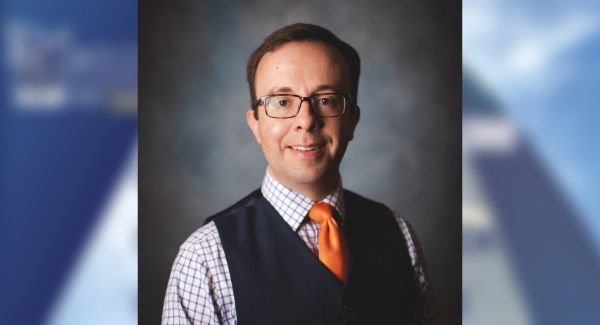Newman University Medieval Philosophy Professor John Brungardt, Ph.D., recently spoke at a colloquium held at the IPC-Paris, a small college in downtown Paris.
The institution he spoke at was founded by students of philosopher and professor Charles De Koninck, who taught at the University of Laval, Canada.
The goal of the colloquium was to commemorate De Koninck and co-founder Msgr. Maurice Dionne, a philosopher who taught several founders of Thomas Aquinas College (TAC) at the Université Laval in Quebec. This academic year also marks the 50th anniversary of the school.
Brungardt received his undergraduate degree from TAC, founded by other De Koninck students, and presented his doctoral dissertation at The Catholic University of America on De Koninck’s understanding of the philosophy of nature and the philosophy of science.
He is also general editor of The Charles De Koninck Project, a work in progress to collect De Koninck’s work on a single website with the purpose of promoting his work and deeply learn and discuss the “spirit of his studies” according to their website.
Brungardt’s invite to present at the colloquium came in part because of his connections with TAC, but also because of a previous research assignment in Santiago, Chile, where he met one of the IPC-Paris professors.
When he learned of his invitation, he said he was excited, “especially given the connections between my research and academic history. The title of my talk was, ‘Charles De Koninck and the Cosmos of the Natural Sciences,'” explained Brungardt.
“De Koninck originally thought — along with many Catholic, Thomistic philosophers — that the old ideas about a ‘philosophy of nature’ and the new ‘natural sciences’ were totally different approaches to knowing the natural world. My talk discussed one of De Koninck’s crucial essays in which he explains his reasons for changing his mind on this issue and in which he proposes reasons for thinking that, despite various legitimate differences in approach and points of detail, both the philosophy of nature and the natural sciences are fundamentally united in their ultimate aims.”
Brungardt said narrowing down the presentation topic was easy but wanted to include some ideas of his own teachers from TAC so he could contribute to the IPC’s celebration of its intellectual, community heritage and mission.
Being the only English-speaking presenter at the colloquium, he said he was grateful for the leniency everyone showed.
“My French is limited to academic reading purposes but I could follow their questions. I had to make sure to speak slowly enough when speaking. I could tell some people were following when they laughed at my opening joke: apologizing for not only addressing them in English, but American English, and Midwestern American English at that!”
Overall, his experience was fulfilling and gratifying. He said he found a very similar understanding, appreciation for and approach to philosophy in university education at the IPC. He added that he hoped the audience would gain a better understanding of the importance of De Koninck’s essay and its argument, especially how it’s still relevant today.
“The most gratifying part of the experience was to meet several of the French academics whose work I had read before, or with whom I had interacted via online or email exchanges. I also met the scholar working on the French-language version of the De Koninck Project, at the University of Laval, and he and I will be in touch regarding my own projects for De Koninck in English.”
Brungardt’s travels took place before the public gathering ban in Wichita, KS and before travel bans took place due to the growing concern of COVID-19. Yet he decided it would be best to self-quarantine upon his return. He is doing well and was grateful for the extended spring break so he had time to prepare to move his classes online for the remainder of the semester.


